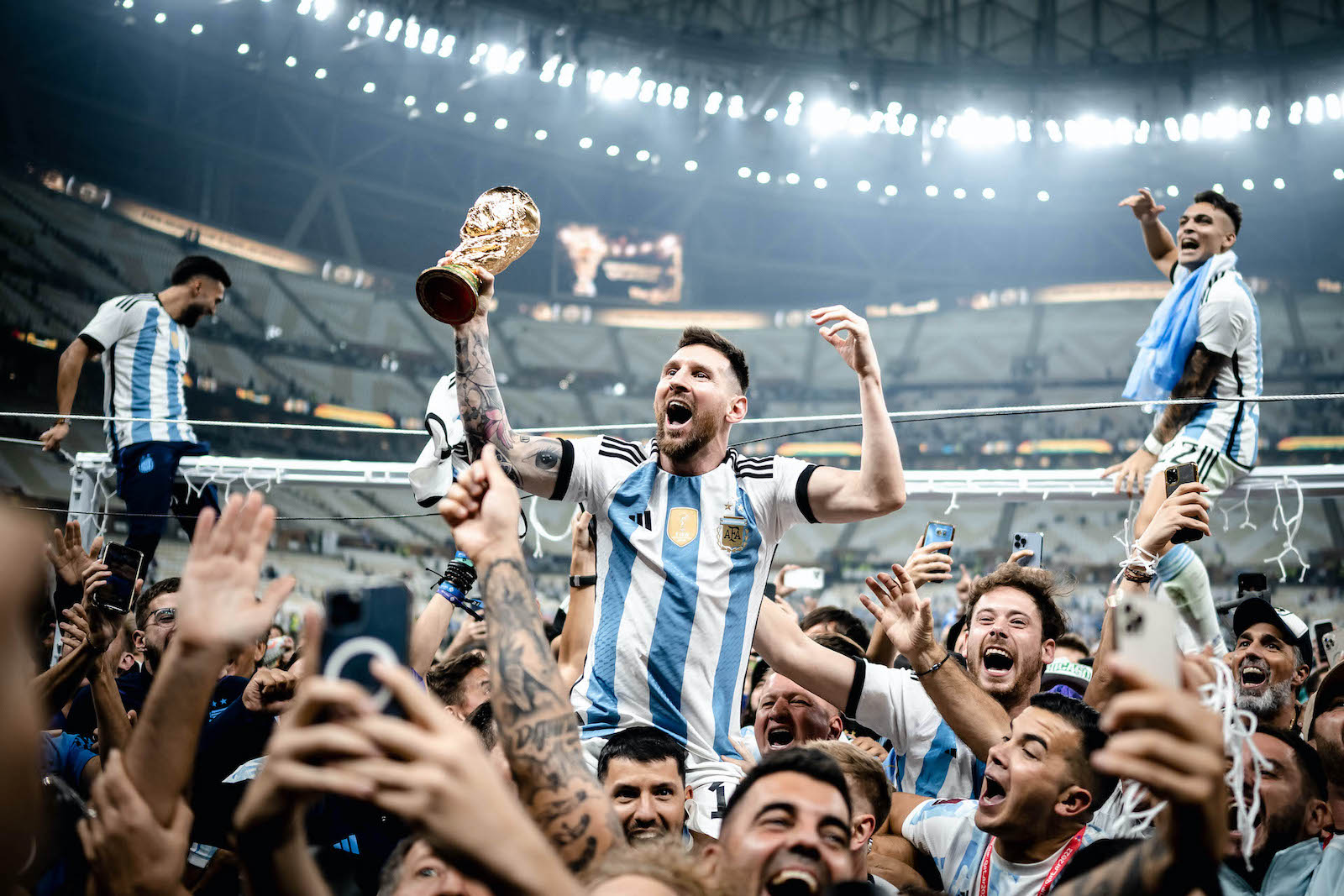Has Soccer Been the Winner in the World Cup?

Lionel Messi of Argentina celebrates victory with the trophy after the FIFA World Cup Qatar 2022 Final match between Argentina and France at Lusail Stadium on December 18, 2022 in Lusail City, Qatar.
Photo by Marvin Ibo Guengoer, GES Sportfoto/Getty Images
As the first soccer World Championship to be held in the Middle East, the Qatar World Cup was both historic and controversial. And the political controversies have been on full display — from LGBTQ rights to defending Iran’s protesters, the world was watching. Are these political debates the new normal in soccer?
The Altamar podcast team of Peter Schechter and Muni Jensen spoke to Nick Sprague, a sports analyst and tech entrepreneur who traveled to Doha for the tournament. Sprague explained that the crowds were smaller than hoped for. “It looks like about 400,000 to 500,000 fans traveled in, which is well short of the 2 million fans that the tournament was hoping to attract.
“I think that they will look back and lament really a tactical error that was made, which was there was price gouging on airfare and lodging at the last minute. … That really cut against the whole idea of subsidizing the event in excess of $200 billion to get as many people to come as possible.”
Has FIFA’s Reputation Been Permanently Tarnished?
The decision to choose Qatar as host was tainted with controversy and corruption. “Almost everyone [at FIFA] who was involved with awarding this tournament to Qatar over a decade ago is no longer around, even on the Qatari side. … But this was the first time the Middle East has hosted a World Cup. And once that decision was made, I think it was very tricky for any of the new stakeholders that have stepped in to change that, despite the reputational damage that many have suffered as a result of it,” notes Sprague.
“If you take the different stakeholders, like the corporates as an example, there were some brands that decided to sit this tournament out because of the noise surrounding it. But overall, it’s been record sponsorship revenue for FIFA. So in general, the response has been: This is a massive event that transcends the world, and I want in on it.”
“I think the media coverage of this tournament has been extremely high, regardless of which angle they’re covering. … If you take it from the players’ perspective, the tournament continues to be a life-altering event. … The World Cup is a very good example of where increased money and power and influence in sport is, in general, a good thing.”
But there is also a dark side to politics and sports. Sprague thinks the backlash against the sport will continue. “Take the Russian oligarchs having to sell their ownership stakes in English Premier League teams in the aftermath of the Ukraine invasion. … That’s a clear example where … a backlash will occur, but it’s still narrow and specific to particular things. Because the overall alignment of money and power and influence is still too valuable for the stakeholders across the board to look the other way.”
Despite the controversies about Qatar cracking down on players wearing One Love armbands. Sprague thinks the tournament was a positive for LGBTQ rights in the region. “I say that because I was really surprised how much discussion on the topic was generated in places that it was not discussed before.”
A Breakthrough for the Developing World?
Sprague says that despite the successes of teams like Morocco, there is still a small club of eight World Cup winners. “It’s Brazil, Argentina, France, England, Germany, Spain, Uruguay, and Italy.
“It’s so hard because of the depth of the talent pool that the traditional powers bring to the table. You look at Brazil and France’s 26-man rosters, and you realize that there’s almost no drop-off from player number three on the roster to player number 26. … And you think how hard it is to get through seven games against teams with that kind of depth and to be the last man standing.”
Sprague thinks the tournament was a turning point for the USA team. “The tournament was somewhat shocking because we saw two European blue bloods, England and the Netherlands, concede possession and control of the game to the U.S. This is unprecedented for U.S soccer. … What’s happened in the U.S. is, now you’ve got this huge professional league in MLS with almost 30 teams that have been operating for three decades now, and you’ve got a scouting and development pipeline that’s drawing on a massive number of people, 330 million people.”
The next tournament is in 2026, which the United States, Mexico, and Canada will jointly host. What will the driving political message be? Sprague said, “This tournament in 2026 is explicitly commercial. I think it’s going to be because of the commercial nature of the tournament, it will be hard for political issues to break through because it’s going to be like 11 simultaneous Super Bowls being played out throughout the United States, which as we know, is the world’s largest media market.”







